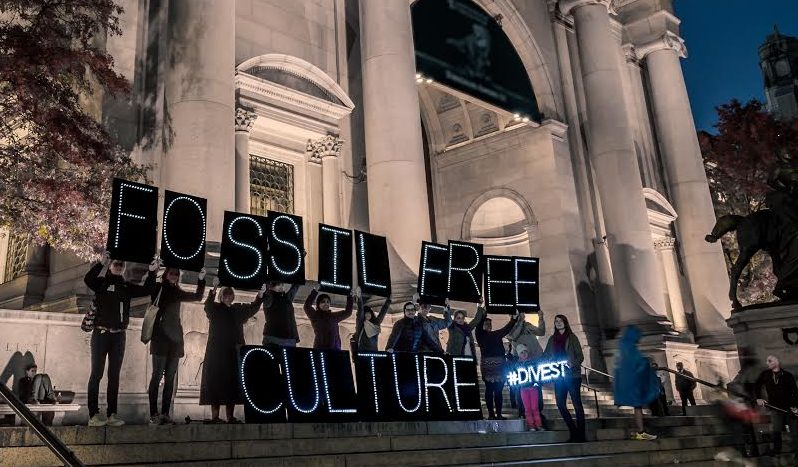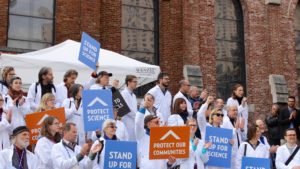UPDATE 12/13: Press coverage in IFL Science, Mashable, Common Dreams, CleanTechnica, and Blooloop.
New York’s American Museum of Natural History has responded to a campaign initiated by The Natural History Museum along with scientists, museum colleagues, and allies by communicating it has reduced fossil fuel exposure to its $650 million endowment. As the country’s oldest, largest and one of the most popular museums with approximately five million visitors each year, this will reverberate across the sector and around the world.
In March 2015, we teamed up with more than 150 of the world’s top scientists to release an unprecedented letter calling on museums of science and natural history to cut ties with fossil fuel interests. Since then, at least seven museums have responded by divesting from fossil fuels, dropping oil, gas or coal companies as sponsors, or implementing new funding policies.
“As anti-science forces have gained unprecedented power in the White House and Congress, the role of our most trusted institutions of science is more important than ever,” said Beka Economopoulos of The Natural History Museum, a mobile and pop-up museum that champions bold climate action. “We applaud the American Museum of Natural History for slashing investments in the very companies that have spread climate science disinformation for decades. We hope this encourages other science museums to stand up for science and cut ties to fossil fuels.”
The fossil fuel divestment movement is the fastest growing divestment movement in history, according to Oxford University. The urgent call for institutions to cut ties with fossil fuels has has spread beyond usual advocates. We now see scientists and museum professionals organizing within their sectors, urging their institutions to lead the way.
Today, the Divest-Invest network unveiled the third annual Arabella report revealing that fossil fuel divestment movement has doubled since September 2015, with commitments reaching 688 institutions spanning 76 countries, and representing more than $5 trillion in assets under management.
“Museums are among the most trusted institutions in society. They educate the public and shape culture. A $21 billion dollar industry, the museum sector sees more visitors annually than sporting events and theme parks combined”, says Elizabeth Wylie from the American Alliance of Museums’ PIC-GREEN sustainability professional association. “Museums that divest from industries that harm the environment and threaten our collective future are using their bully pulpit well.”
James Powell, a geologist and former Director and President of the Los Angeles County Natural History Museum and former President of the Franklin Science Institute said “the news from the American Museum of Natural History is a welcome outcome of advocacy from scientists, museum professionals and allies. It’s difficult to reconcile the missions of museums focused on science and ecology with the practice of investing in fossil fuels.”
In August 2015, activists joined scientists in urging the nation’s museums of science and natural history specifically to divest. More than 50,000 people took part in the campaign. In a move that escalated the call, The Natural History Museum and 350.org sent a letter to the American Museum of Natural History pointing out its unique responsibility to act as a leader on climate.
The fossil free culture movement has taken hold across North America, Europe and Australia. Notable institutions, such as the California Academy of Sciences, Phipps Conservatory and Botanical Gardens, Field Museum in Chicago and the Australian Academy of Science, have announced their commitments to cut ties with fossil fuels.
In the face of the anti-climate-science Trump administration, it is more critical than ever that the world’s most trusted institutions step up to take meaningful action on climate change. Scientists and their allies will continue to call on our institutions to #StandUpForScience and for our future.
“In the face of climate catastrophe, our cultural institutions have a unique responsibility to do more than observe and curate history — they must stand up to help make it,” said Katie McChesney, 350.org US Divestment Campaign Manager. “As we enter the final weeks of the hottest year in history, with a regressive and corrupt incoming administration, it is not enough for museums to accept the scientific consensus on human-caused climate change. We need museums of science and natural history to take a stand.”
###
To view The Natural History Museum and 350.org’s letter to the AMNH, visit: http://gofossilfree.org/wp-content/uploads/2016/12/LettertoAMNHPresidentFutter.pdf
To view the AMNH’s response, visit: http://gofossilfree.org/wp-content/uploads/2016/12/stoddard_letter.pdf




